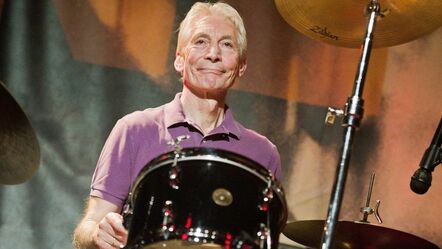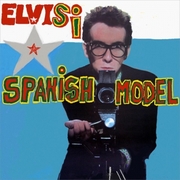New York, NY (Top40 Charts) Rolling Stones drummer Charlie Watts, who helped them become one of the greatest bands in rock 'n' roll, has died at the age of 80.
"It is with immense sadness that we announce the death of our beloved Charlie Watts," a statement said.
It said he was "a cherished husband, father and grandfather" and "one of the greatest drummers of his generation".
Tributes have come from stars including The Beatles' Sir
Paul McCartney and Sir Ringo Starr, and Sir Elton John.
Biography :
Charles Robert Watts (2 June 1941 - 24 August 2021) was an English drummer who achieved international fame as the drummer for the Rolling Stones. He was one of the band's longest serving members, joining in January 1963 and remaining a member until his death in 2021.
Originally trained as a graphic artist, he started playing drums in London's rhythm and blues clubs, where he met Brian Jones, Mick Jagger, and Keith Richards. In January 1963, he joined their fledgling group, the Rolling Stones, as drummer, while doubling as designer of their record sleeves and tour stages. Watts, along with Jagger and Richards, are the only band members to have been featured on all of their studio albums. He cited jazz as a major influence on his drumming style. He toured with his own group, the Charlie Watts Quintet, and appeared in London at Ronnie Scott's Jazz Club with the Charlie Watts Tentet.
In 2006, Watts was elected into the
Modern Drummer Hall of Fame; in the same year, Vanity Fair elected him into the International Best Dressed List Hall of Fame. In the estimation of music critic Robert Christgau, Watts was "rock's greatest drummer". In 2016, he was ranked 12th on Rolling Stone's "100 Greatest Drummers of All Time" list.
Charles Robert Watts was born at University College Hospital in Bloomsbury, London, to Charles Richard Watts, a lorry driver for the London,
Midland and Scottish Railway, and his wife Lillian
Charlotte (née Eaves). He had a sister, Linda.
As a child, Watts lived in Wembley, at 23 Pilgrims Way. Many of Wembley's houses had been destroyed by Luftwaffe bombs during World War II; Watts and his family lived in a prefab, as did many in the community. Watts's neighbour Dave Green, who lived opposite at 22 Pilgrims Way, was a childhood friend, and they remained friends until Watts's death; Green became a jazz bass player. Green recalls that as boys, "we discovered 78rpm records. Charlie had more records than I did ... We used to go to Charlie's bedroom and just get these records out." Watts's earliest records were jazz recordings; he remembered owning 78 RPM records of
Jelly Roll Morton and Charlie Parker. Green recalls that Watts also "had the one with Monk and the Johnny Dodge Trio. Charlie was ahead of me in listening and acquisitions."
Watts and his family subsequently moved to Kingsbury, where he attended Tylers Croft Secondary
Modern School from 1952 to 1956; as a schoolboy, he displayed a talent for art, music, cricket, and football. When he and Green were both about thirteen, Watts became interested in drumming:
I bought a banjo, and I didn't like the dots on the neck. So I took the neck off, and at the same time I heard a drummer called
Chico Hamilton, who played with Gerry Mulligan, and I wanted to play like that, with brushes. I didn't have a snare drum, so I put the banjo head on a stand.
Watts's parents gave him his first drum kit in 1955, and he practised drumming along to jazz records he collected.
After completing secondary school, Watts enrolled at Harrow Art School (now the Harrow campus of the University of Westminster), which he attended until 1960. After leaving art school, he worked as a graphic designer for an advertising company called Charlie Daniels Studios, and also played drums occasionally with local bands in coffee shops and clubs. He and Green began their musical careers together from 1958 to 1959, playing in a jazz band in Middlesex called the Jo Jones All Stars. Watts initially found his transition to rhythm and blues puzzling: "I went into rhythm and blues. When they asked me to play, I didn't know what it was. I thought it meant Charlie Parker, played slow."
In 1961, Watts met Alexis Korner, who invited him to join his band, Blues Incorporated. At that time, Watts was on his way to a sojourn working as a graphic designer in Denmark, but he accepted Korner's offer when he returned to London in February 1962. Watts played regularly with Blues Incorporated and maintained a job with another advertising firm of Charles, Hobson and Grey. It was in mid-1962 that Watts first met Brian Jones, Ian "Stu" Stewart, Mick Jagger, and Keith Richards, who also frequented the London rhythm and blues clubs, but it was not until January 1963 that Watts finally agreed to join the Rolling Stones. Initially, the band could not afford to pay Watts, who had been earning a regular salary from his gigs. His first public appearance as a permanent member was at the Ealing Jazz Club on 2 February 1963.
Besides his work as a musician, Watts contributed graphic art and comic strips to early
Rolling Stones records such as the Between the
Buttons record sleeve and was responsible for the 1975 tour announcement press conference in New York City. The band surprised the throng of waiting reporters by driving and playing "
Brown Sugar" on the back of a flatbed truck in the middle of Manhattan traffic. Watts remembered this was a common way for New Orleans jazz bands to promote upcoming dates.
Moreover, with Jagger, he designed the elaborate stages for tours, first contributing to the lotus-shaped design of that 1975 Tour of the Americas, as well as the 1989-1990 Steel Wheels/Urban
Jungle Tour, the 1997-1998 Bridges to Babylon Tour, the 2002-2003 Licks Tour, and the 2005-2007 A Bigger Bang Tour.
Watts was involved in many activities outside his life as a member of The Rolling Stones. In December 1964, he published a cartoon tribute to Charlie Parker entitled Ode to a High Flying Bird. Although he made his name in rock, his personal tastes lay principally in jazz. In the late 1970s, he joined Ian Stewart in the back-to-the-roots boogie-woogie band Rocket 88, which featured many of the UK's top jazz, rock. and R&B musicians. In the 1980s, he toured worldwide with a big band that included such names as Evan Parker, Courtney Pine, and Jack Bruce, who was also a member of Rocket 88. In 1991, he organised a jazz quintet as another tribute to Charlie Parker. 1993 saw the release of Warm and Tender, by the Charlie Watts Quintet, which included vocalist Bernard Fowler. This same group then released Long Ago and Far Away in 1996. Both records included a collection of Great American Songbook standards. After a successful collaboration with Jim Keltner on The
Rolling Stones LP Bridges to Babylon, they released a techno/instrumental album simply titled, Charlie Watts/Jim Keltner Project. Watts stated that even though the tracks bore such names as the "Elvin Suite" in honour of the late Elvin Jones, Max Roach, and Roy Haynes, they were not copying their style of drumming, but rather capturing a feeling by those artists. Watts at Scott's was recorded with his group, "the Charlie Watts Tentet", at the Ronnie Scott's Jazz Club in London. In April 2009, he started to perform concerts with the ABC&D of
Boogie Woogie (including pianists Axel Zwingenberger and Ben Waters plus childhood friend Dave Green on bass).
In 1989, The
Rolling Stones were inducted into the Rock and Roll Hall of Fame. Watts did not attend the ceremony. In the July 2006 issue of
Modern Drummer magazine, Watts was voted into the
Modern Drummer Hall of Fame, joining Ringo Starr, Keith Moon, Steve Gadd,
Buddy Rich, and other highly esteemed and influential drummers from the history of rock and jazz. In the estimation of music critic Robert Christgau, Watts was "rock's greatest drummer." Variety stated on the day of his death that Watts is "universally recognized as one of the greatest rock drummers of all time".
On 14 October 1964, Watts married Shirley Ann Shepherd (born 11
September 1938), whom he had met before the band became successful. The couple had one daughter, Seraphina, born in March 1968, who in turn gave birth to Watts's only grandchild, a girl named Charlotte.
Watts was known for his wardrobe: British newspaper The Daily Telegraph named him one of the World's Best Dressed Men. In 2006, Vanity Fair elected Watts into the International Best Dressed List Hall of Fame.
Watts lived near Dolton, a rural village in west Devon, where he owned an Arabian horse stud farm. He also owned a percentage of The Rolling Stones' various corporate entities.
Watts expressed a love-hate attitude toward touring, stating in 2003 that he "loved playing with Keith [Richards] and the band wasn't interested in being a pop idol sitting there with girls screaming." In a 1996 interview with Rolling Stone magazine, he said that he had sketched every bed he had slept on while on tour since 1967.
Watts's personal life appeared to be substantially quieter than those of his bandmates and many of his rock-and-roll colleagues; onstage, he seemed to furnish a calm and amused counterpoint to his flamboyant bandmates. Ever faithful to his wife Shirley, Watts consistently refused sexual favours from groupies on the road; in Robert Greenfield's STP: A
Journey Through
America with The Rolling Stones, a documentary of the 1972 American Tour, it is noted that when the group was invited to the Playboy Mansion during that tour, Watts took advantage of Hugh Hefner's game room instead of frolicking with the women. "I've never filled the stereotype of the rock star," he remarked. "Back in the '70s, Bill Wyman and I decided to grow beards, and the effort left us exhausted."
One anecdote relates that in the mid-1980s, an intoxicated Jagger phoned Watts's hotel room in the middle of the night, asking, "Where's my drummer?" Watts reportedly got up, shaved, dressed in a suit, put on a tie and freshly shined shoes, descended the stairs, and punched Jagger in the face, saying: "Never call me your drummer again." He expressed regret for the incident in 2003, attributing his behaviour to alcohol.
In the mid-1980s, Watts's previously moderate use of alcohol and drugs became problematic. "[They were] my way of dealing with [family problems] ..." he said. "I think it was a mid-life crisis. All I know is that I became totally another person around 1983 and came out of it about 1986. I nearly lost my wife and everything over my behaviour".
In June 2004, Watts was diagnosed with throat cancer, despite having quit smoking in the late 1980s, and underwent a course of radiotherapy. The cancer went into remission. "I went into hospital," he recalled, "and eight months later Mick said, 'We're going to do a record. But we'll only do it when you're ready.' They were buggering about, writing songs, and when I was ready I went down and that was it, A Bigger Bang. Then I did a two-year tour. It seems that whenever we stop, I get ill. So maybe I should carry on!"
On 5 August 2021, it was reported that Watts had elected to sit out the resumption of the U.S. No
Filter Tour due to an unspecified medical procedure, and that Steve Jordan would temporarily replace him on drums.
Watts died in a London hospital on 24 August 2021, at the age of 80.
Discography:
In addition to his work with the Rolling Stones, Watts released the following albums:
• The Charlie Watts Orchestra - Live at Fulham Town Hall (1986, Columbia Records)
• The Charlie Watts Quintet - From One Charlie (1991, Continuum Records)
• The Charlie Watts Quintet - A Tribute to Charlie Parker with
Strings (1992, Continuum Records)
• The Charlie Watts Quintet - Warm and Tender (1993, Continuum Records)
• The Charlie Watts Quintet - Long Ago and Far Away (1996, Virgin Records)
• The Charlie Watts-Jim Keltner Project (2000, Cyber Octave Records)
• The Charlie Watts Tentet - Watts at Scott's (2004, Sanctuary Records)
• The ABC&D of
Boogie Woogie - The Magic of
Boogie Woogie (2010,
Vagabond Records)
• The ABC&D of
Boogie Woogie - Live in Paris (2012, Eagle Records)
• Charlie Watts meets the Danish
Radio Big Band (Live at the Danish
Radio Concert Hall, Copenhagen 2010) (2017, Impulse! Records).
























